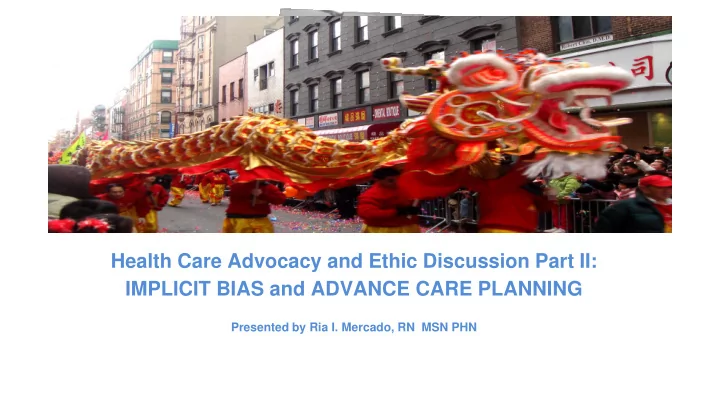

Health Care Advocacy and Ethic Discussion Part II: IMPLICIT BIAS and ADVANCE CARE PLANNING Presented by Ria I. Mercado, RN MSN PHN
New Year: Renewal or Start of Something new … 1.Understanding implicit bias and its impact to healthcare planning of older adults and adults with developmental disabilities. 2. Lean how "Reframing” can be useful in promoting inclusion and equity in meeting the healthcare needs of older adults and adults with developmental disabilities. 3.Identify core skills for initiating advance care planning discussions .
Client Centered and Client Driven Advance Care Planning 1. Diversity 2. Equity 3. Inclusion
Implicit BIAS – What is it? Is the attitudes or sterotypes that affect our understanding, actions, decisions and judgement in an unconsious manner
WHERE it Comes From? Neuroscience - Brain’s tendency to simplify the world and seek for o patterns for survival and with daily activities. Experience - o Social conditioning o
BREAKING DOWN THE BARRIERS: End …Ism 1. Recognize your own bias REFRAMING 2. Training 3. Time 4. Resources
Advance Care Planning Is NOT: B Forms ader Lots of Forms And Advance Care Planning starts with: Legal Witnesses Doctors Nurses Social Workers
ADVANCE CARE PLANNING (ACP) is a process for: Understanding Reflecting Discussing & Formulating an individualized service/care plan with the client
ADVANCE CARE PLANNING (ACP) Advance Care Planning (ACP) and Advance Directives Are NOT the same.
STRENGTHS Ready to start New 1. Multidisciplinary and Interdisciplinary Team members. 2. Providers have multiple and MANY opportunities to initiate discussion and provide guidance with decision making over time. 3. Collaborative team can incorporate Advanced Care Planning (ACP) into the Overall Service/Care plan.
ACP GUIDING PRINCIPLES • Seek first to understand and discover the story our client is telling us. • Seize the opportunity. Be present • Focus on talking and learning; not making decisions • Encourage client and others to reflect • Listen, explore, and listen more
CORE SKILLS OF ADVANCE CARE PLANNING (ACP) Initiate routine and urgent discussions Search out values of living well Explore understanding of disease Clarify statements progression Discover meaning of experiences Assist in understanding ACP Advocate for & communicate client’s wishes Explore barriers to planning Assist in selection and preparation of proxy Make referrals
Advance Care Planning-Consider someone who … 1. Who has had regular contact with you before and after the illness. 2. Is familiar with your wishes and values and will honor those wishes and values. 3. Is able to provide information about your health history, wishes and values. 4. Is able to understand your medical condition 5. Will be able to make decisions about your care in the middle of emotional situation. 6. Is available to come to the hospital 7. Is able to communicate with your health care team 8. Is able to communicate with your love ones, receive from them and share important information with them.
PREPARE TOOLKIT
START … STOP … CONTINUE ✓ START the Conversation with understanding of your own biases ✓ START Reframing and countering stereotypes with positive examples from groups that are unfamiliar or new. ✓ STOP and take time to reflect on your own shortcuts, preferences, habits or tendencies that create blind spots and microinequities. ✓ CONTINUE to explore where implicit bias is undermining our goals for healthcare equity and inclusion
Recommend
More recommend